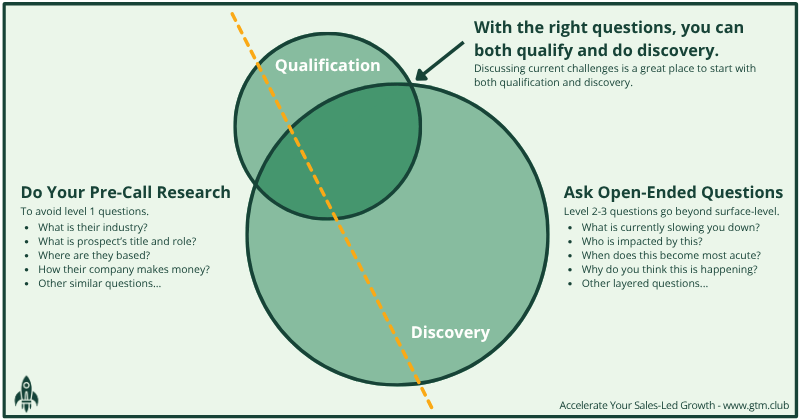Getting to Know Your Prospects: Qualification and Discovery
Understanding your prospects is crucial in the fast-paced world of B2B sales. This article introduces qualification and discovery - two fundamental aspects that help you focus on the right customers and truly understand their needs. This leads to better relationships and more successful deals.

In the fast-paced world of B2B sales, understanding your prospects is crucial for success. This article dives into two fundamental aspects of the sales process: qualification and discovery. Linking to one of the 2025 success factors for sales-led GTM, the disciplined sales process, these topics form the cornerstone of GTM Club's focus for early 2025. After this introductory article, we start by taking a deep dive into qualification - identifying the right prospects - and then move on to discovery, showing how these two processes work together to create more meaningful customer relationships and better sales outcomes.
What is Qualification in Sales?
Qualification in sales is about determining if a potential customer is the right fit for your offering. Think of it as a friendly investigation to determine if your solution matches the prospect's needs. It’s like asking, “Do they need what I’m selling? Can they afford it, and are they ready to buy?” Qualification helps salespeople focus their time on leads most likely to turn into actual customers. By qualifying leads, you avoid wasting time and increase your chances of closing deals.
Why Is Qualification Important?
Qualification is important because it helps you focus on the right customers—those who need your product and are likely to buy. Without proper qualification, you might spend weeks nurturing a lead only to discover they don't have the budget or authority to make a purchase. It also ensures you address the customer’s real needs, build better relationships, and close deals faster. Ultimately, it makes your sales process more efficient and increases your success rate. It’s about working smarter to achieve better results. Think of qualification as having a filter that helps you focus your energy on prospects who need your solution and can buy it.
Think of qualification as having a filter that helps you focus your energy on prospects who actually need your solution and can buy it.
How to Know if Your Customer is a Good Fit?
Four common qualification criteria are repeated, more or less, across the better-known qualification frameworks used in B2B sales. So we recommend that to effectively qualify your customers, use at least the following criteria:
- Customer Needs and Challenges: Verify that their challenges align directly with what your product or service can solve. Are they experiencing the specific pain points your solution addresses?
- Financial Capability: Ensure they have the financial resources to invest in your solution and that the investment makes sense for their business scale.
- Decision-Makers: Confirm you're talking to someone who can either make or strongly influence the purchasing decision.
- Timeline and Urgency: Assess whether they have a clear implementation timeline and whether solving this problem is a current priority.
Remember, a good fit isn't just about meeting criteria—it's about finding customers who will benefit from your solution and have the means to implement it successfully.
There are many frameworks available for sales to qualify prospects. Perhaps the best-known are BANT (Budget, Authority, Need, Timeline) and MEDDIC (Metrics, Economic Buyer, Decision Criteria, Decision Process, Implicate Pain, Champion). Some companies prefer the more customer-centric CHAMP (Challenges, Authority, Money, Prioritisation) or N.E.A.T. Selling™ (Need, Economic Impact, Access to Authority, and Timeline), while others emphasise authorised decision-makers more with ANUM (Authority, Need, Urgency, and Money) or prioritise investment capability over other aspects via FAINT (Funds, Authority, Interest, Need, and Timing). Each framework has its strengths and is suited for different sales processes and industries.
Also worth mentioning is that some frameworks like MEDDIC, SCOTSMAN® and GPCTBA/C&I provide broader qualification criteria than those presented above.
What is Discovery in Sales?
Discovery in sales is like being a friendly detective, genuinely curious about understanding your potential customer's world. More concretely, discovery is learning about your potential customer to understand their needs, goals, and challenges, which are essential to them. Instead of jumping straight into your product pitch, you take time to ask thoughtful questions and listen carefully to understand their unique situation. This deeper understanding allows you to present your solution in a way that specifically addresses their needs rather than giving a generic sales pitch.
Why Is Discovery Important?
Discovery is important because it helps you understand what your customer needs, instead of guessing. When you take the time to discover your prospect's challenges, goals, and motivations, you can present solutions that genuinely address their needs rather than just pushing a generic sales pitch. Good discovery builds trust and credibility, as customers appreciate it when you show genuine interest in their situation. It also helps you avoid misunderstandings and reduces the chances of surprises later in the sales process. Perhaps most importantly, the insights gained during discovery enable you to demonstrate real value by connecting your solution directly to your customer's specific pain points and desired outcomes. In short, discovery sets the stage for a more meaningful and successful sales conversation.
Discovery sets the stage for a more meaningful and successful sales conversation.
How to Learn About Your Customer's Needs
To learn about your customers’ needs, ask open-ended questions about their goals, challenges, and current processes. Listen actively. Pay attention to what they say and how they say it - their tone and body language can reveal more profound insights into their pain points. Follow up on interesting points they mention to dig deeper, showing genuine curiosity rather than just going through a checklist. Most importantly, focus on building an authentic connection by showing empathy and understanding, as people are more likely to open up when they feel heard and respected.
Here are some discovery questions.
- Pain Points: "What's the biggest challenge you face in this area?" and "What happens if this issue isn't resolved?"
- Current Situation: "Can you walk me through how you're currently handling this process?" and "What tools or systems are you using right now?"
- Goals and Objectives: "What would an ideal solution look like for you?" and "What specific outcomes are you hoping to achieve?"
- Business Impact: "How does this challenge affect your bottom line?" and "How does this align with your company's broader objectives?"
Similar to qualification, there are several discovery frameworks in sales. Some of the better-known ones are SPIN Selling (Situation, Problem, Implication, Need-Payoff), 5W1H and the Five Whys questioning techniques. Some of the qualification frameworks from above can even be extended to cover discovery, too (N.E.A.T. Selling™, for one). Again, the best approach to discovery is company and offering-dependent.
What are the Similarities Between Qualification and Discovery?
Both qualification and discovery share the common goal of understanding your potential customer better from different angles. They both involve asking questions and actively listening to your prospect's responses, helping build trust and rapport. Both activities typically happen early in the sales process and overlap naturally in conversation; you might uncover qualification information during discovery and vice versa. Both methods are crucial for preventing wasted time and achieving better outcomes for both the seller and the buyer. Finally, qualification and discovery require practice and genuine curiosity about your prospect's situation.

What Is the Difference Between Qualification and Discovery?
While qualification and discovery often happen together, they serve different purposes in the sales process. Doing just one is not enough.
Qualification involves determining if a prospect is a good fit for your solution by checking specific criteria, such as budget and decision-making authority. Think of it as checking boxes to see if pursuing this lead makes sense. On the other hand, discovery is more about curiosity, asking open-ended questions to learn your prospect's world, challenges, and goals. Discovery builds relationships and uncovers needs, while qualification helps you decide if investing time in those relationships is worthwhile.
Discovery builds relationships and uncovers needs, while qualification helps you decide if investing time in those relationships is worthwhile.
Consider qualification as the “should we proceed?” stage and discovery as the “how can we help?” stage. Together, they ensure you focus on the right customers with the right message.
Common Questions About Qualification and Discovery?
Some common questions arise when discussing qualification and discovery in a sales organisation.
About Qualification:
- What criteria should I use to qualify a lead?
- When is the right time to qualify a prospect in the sales process?
- How do I politely disqualify a lead that doesn’t meet my criteria?
About Discovery:
- What are the best questions to ask during a discovery call?
- How do I uncover a customer’s actual pain points?
- How do I ensure I’ve gathered enough information before moving forward?
Effective qualification and discovery are foundational skills in modern B2B sales. When done right, they work together to help you focus on the right prospects and really understand their needs. This combination leads to better relationships, more successful deals, and, ultimately, happier customers.




